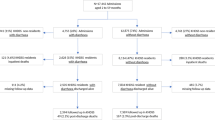Abstract
Children with severe malnutrition and diarrhea have high mortality rates that have been attributed to faulty case-management. Health workers are often unaware of the unique treatment requirements of severely malnourished children resulting in improper case-management. Moreover, the lack of prescriptive guidelines promotes the exercise of discretion in case-management that is often detrimental. Appropriate feeding from the start of treatment, routine micronutrient supplementation, broad-spectrum antibiotic therapy, less use of intravenous fluids for rehydration, and careful management of complications are factors that can reduce death, morbidity and cost of treating children with severe malnutrition and acute illnesses including diarrhea. In this paper is discussed a standardized protocol based upon the above mentioned factors for the management of severely malnourished children with acute illnesses including diarrhea. Implementation of the protocoi resulted in a 47% reduction in mortality in these children.
Similar content being viewed by others
References
Schofield C, Ashworth A. Why have mortality rates for severe malnutrition remained so high?Bull WHO 1996; 74: 223–229.
Ramos GR, Miranda CJ. Deaths among children with third degree malnutrition: influence of the clinical type of the condition.Am J Clin Nutr 1965; 16: 351–355.
World Health Organization. Management of severe malnutrition : a manual for physicians and other senior health workers; Geneva, 1999.
Suskind D, Murthy KK, Suskind RM. The malnourished child: an overview. In Suskind RM and Suskind LL, eds,The malnourished child. New York; VeveyJRaven Press, 1990; 1–22.
Tahmeed A, Ali M, Ullah M, Choudhury IA, Haque ME, Salam MA, Rabbani GH, Suskind RM, Fuchs GJ. Mortality in severely malnourished children with diarrhoea and use of a standardised management protocol.Lancet 1999; 353: 1919–1922.
Frenk S. Protein-energy malnutrition. In Arneil GC and Metcoff J, eds.Pediatric Nutrition. London; Butterworths, 1985; 153–193.
Golden MHN. Marasmus and kwashiorkor. In Dickerson JWT and Lee MA, eds.Nutrition in the Clinical Management of Disease. London: Edward Arnold, 1988; 88–109.
World Health Organization. Acute respiratory infections in children. Case management in small hospitals in developing countries : a manual for doctors and other health workers. Geneva, 1990.
Mann MD, Bowie MD, Hansen JDL. Total body potassium and serum electrolyte concentrations in protein energy malnutrition.S Afr Med J 1975; 49: 76–78.
Smith R, Waterlow JC. tal exchangeable potassium in infantile malnutrition.Lancet 1963; 147–149.
Caddell JL, Suskind R, Sillup H, Olson RE. Parenteral magnesium load evaluation of malnourished Thai children.J Pediatr 1973; 83: 129–135.
Rodriguez-Soriano J. Malnutrition and electrolyte metabolism. In Suskind RM and Suskind LL, eds.The Malnourished Child. New York; VeveyJRaven Press, 1990; 141–152.
Author information
Authors and Affiliations
Corresponding author
Rights and permissions
About this article
Cite this article
Ahmed, T., Begum, B., Badiuzzaman et al. Management of severe malnutrition and diarrhea. Indian J Pediatr 68, 45–51 (2001). https://doi.org/10.1007/BF02728857
Issue Date:
DOI: https://doi.org/10.1007/BF02728857




